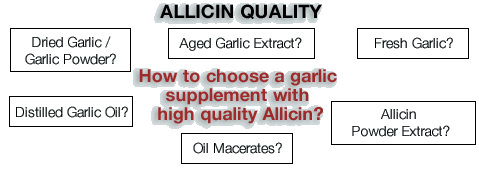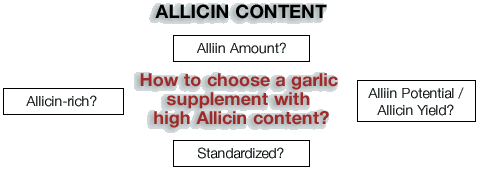Do you know your body will get much more benefit if you can eat garlic that has been cut into slices as crushing will destroy much of the active Allicin? This is because Allicin is produce immediately when the garlic enzyme allinase interacts with alliin. Allicin produced by the crushed garlic will be wasted if it is not consumed immediately.
Since Allicin is not actually present in garlic, how do you know the Allicin content in a garlic supplement? Following are types of information that are commonly found in garlic supplement products (garlic pills, garlic capsules). Read this information carefully and use them to guide you on selecting a garlic supplement:
- How to choose a garlic supplement with quality Allicin?
- How to choose a garlic supplement with high Allicin content?
- Does a statement like “Brand X contains an equivalent of 1000mg of fresh garlic” tell you anything?
- What should I look for in a garlic supplement?
- Why do so many garlic products fail to deliver Allicin?
- How much Allicin do I need?

| Terms | Example | Content |
|---|---|---|
| Fresh garlic | “Each tablet is equivalent to 4800 mg of fresh garlic” | Fresh garlic does not contain any Allicin. The reasons are:
|
| Dried garlic/ garlic powder | Kwai, Puregar, Garlicin, Allirich | None of these products contain any Allicin. Dried garlic powder contains both the allinase and alliin (precursor to Allicin) but not Allicin (1).On an equivalent weight, dry garlic powder has a higher level of alliin (3x) than fresh garlic. To preserve the allinase activity that is sensitive to stomach acid (so that alliin can be converted to Allicin), dried garlic powder is sometimes enterically coated, so that some Allicin can be produced in the intestine. This is a highly imprecise technology and the amount of Allicin finally realized is hard to determine. |
| Allicin powder extract | Allisure, Allimax, Alliforce, Allitru, Alli-C | Unlike fresh garlic and dried garlic powder, Allicin powder extract contain a stable amount of bio-available Allicin that is ready to be used by the body. |
| Aged garlic extract | Kyolic ® | Aged garlic does not contain Allicin (1). Aged garlic is produced through a slow decomposition process where garlic bulbs are aged up to 20 months. The end product is a S-allylcysteine (SAC) product popularly known as Kyolic.S-allylcysteine does deliver some of Allicin’s benefits, but in a much reduced potency and only a fraction of Allicin’s broad spectrum of benefits. |
| Distilled garlic oil | Does not contain Allicin. Distilled garlic oil involves heating crushed garlic in boiling water and collecting the steam as it vaporizes. | |
| Oil macerates | Does not contain Allicin. Originally used as a condiment, it consists of garlic cloves or garlic powder mixed into vegetable oil and then encapsulated |
Summary:
- Most garlic supplements do not contain Allicin itself. Some products are standardized to contain a certain amount of alliin and will list the theoretical Allicin potential. Some supplements claim to contain as much or more Allicin as daily dose of fresh garlic; read the labels to be sure. Tests indicate a wide variation among commercially available supplements.
- The content of Allicin the most important indicator and Allicin should be in a defined in terms of microgram (mcg) or milligram (mg) and in a standardized amount
- If Allicin content is not available, try to look for enteric coated garlic products, which have at least a small chance of producing some Allicin, although the amount created will rarely be of therapeutic value.
- Allicin powder extract is the only way to get a stable and standardized amount of Allicin that is ready to be used by the body directly.

| Terms | Example | Content |
|---|---|---|
| “Allicin-rich” | Product X is “Allicin-rich” | This frequently used term is meaningless and does not define the contents of Allicin in a product. Allicin content should be expressed and quantified in terms of microgram (mcg) or milligram (mg). |
| Alliin amount | Product X contains “10mcg alliin” | Not a good indicator. The many health benefits of garlic are derived from Allicin, not alliin (pronounced Al’-ee-in). Alliin is a precursor compound to Allicin. Allicin conversion depends on the amount and activity of the converting enzyme allinase and alliin. On its own, alliin is only of limited value. |
| Allicin potential/ Allicin yield | “5000 mcg Allicin potential” | At best this is just a ‘theoretical’ value of Allicin measured in a glass of water, not the body. This is because when garlic supplements are swallowed, allinase enzyme is rapidly destroyed by stomach acid and thus preventing the production of Allicin. |
| Standardized | “Standardized garlic/ Allicin” | Indicates each batch of the product contains a consistent amount of the constituent (allinase, alliin. Allicin, etc) |
Does a statement like “Brand X contains an equivalent of 1000mg of fresh garlic” tell you anything?
It depends! This type of statement aims to highlight the ‘strength’ or the potency of the product. But most of the time it only tells you one side of the story; the important information to look for is Allicin (expressed in mcg or mg). 1000mg of fresh garlic does not mean the product contains 1000 mg of Allicin, in fact, water makes up 65% of fresh garlic. Always read the product label. Of the many commercially available preparations, Allicin powder extract is the only stable Allicin extract that is ready to used by the body directly.
It depends! This type of statement aims to highlight the ‘strength’ or the potency of the product. But most of the time it only tells you one side of the story; the important information to look for is Allicin (expressed in mcg or mg). 1000mg of fresh garlic does not mean the product contains 1000 mg of Allicin, in fact, water makes up 65% of fresh garlic. Always read the product label. Of the many commercially available preparations, Allicin powder extract is the only stable Allicin extract that is ready to used by the body directly.
What should I look for in a garlic supplement?
There are a few important considerations to note when choosing a garlic product. First of all, it is important to make sure that the product provides a sufficient level of Allicin. Since Allicin is not actually in the product at all, manufacturers often refer to the Allicin potential or Allicin yield. These terms suggest the amount of Allicin produced when allinase is activated in the garlic tablet or powder, but several indpendent studies have confirmed that this process is highly inefficient, yielding only a very small fraction of the claimed yield/potential in reality at best.
Allicin powder extracts are a much better choice because they are the only ones to deliver a standardized amount of Allicin that is stable and can be used directly by the body.Such products are becoming more commonplace now and are set to take over, where the traditional garlic supplements left off, as they are the first garlic products to actually deliver a replicable therapeutic benefit.
There are a few important considerations to note when choosing a garlic product. First of all, it is important to make sure that the product provides a sufficient level of Allicin. Since Allicin is not actually in the product at all, manufacturers often refer to the Allicin potential or Allicin yield. These terms suggest the amount of Allicin produced when allinase is activated in the garlic tablet or powder, but several indpendent studies have confirmed that this process is highly inefficient, yielding only a very small fraction of the claimed yield/potential in reality at best.
Allicin powder extracts are a much better choice because they are the only ones to deliver a standardized amount of Allicin that is stable and can be used directly by the body.Such products are becoming more commonplace now and are set to take over, where the traditional garlic supplements left off, as they are the first garlic products to actually deliver a replicable therapeutic benefit.
Why do so many garlic products fail to deliver Allicin?
Dr. Larry D. Lawson, a respected researcher, discovered that there were basically two major problems. First of all, many of the garlic products contained little allinase activity, an enzyme needed to convert alliin into alicin. As a result, the level of Allicin formed was also low. Next, Dr. Lawson found that many of the tablets contained excipients (e.g., binders and fillers) that actually inhibit/block allinase activity. In a study, Dr. Lawson found that the allinase activity in the vast majority of the brands studied was less than 10% of expected activity. The inability to release an effective dose of Allicin would explain why so many of the studies with garlic supplements failed to show benefit in lowering cholesterol or blood pressure. Therefore, garlic supplements that require allinase to convert alliin into Allicin in the body are not an ideal solution!
Dr. Larry D. Lawson, a respected researcher, discovered that there were basically two major problems. First of all, many of the garlic products contained little allinase activity, an enzyme needed to convert alliin into alicin. As a result, the level of Allicin formed was also low. Next, Dr. Lawson found that many of the tablets contained excipients (e.g., binders and fillers) that actually inhibit/block allinase activity. In a study, Dr. Lawson found that the allinase activity in the vast majority of the brands studied was less than 10% of expected activity. The inability to release an effective dose of Allicin would explain why so many of the studies with garlic supplements failed to show benefit in lowering cholesterol or blood pressure. Therefore, garlic supplements that require allinase to convert alliin into Allicin in the body are not an ideal solution!
How much Allicin do i need?
When choosing an Allicin containing supplement, it should contain at least 180mg of Allicin Powder. With more such competing products set to be entering the market, watch out for the actual Allicin strength (if it is declared), as this may vary from product to product, depending on how advanced the product’s stabilization technology is.
When choosing an Allicin containing supplement, it should contain at least 180mg of Allicin Powder. With more such competing products set to be entering the market, watch out for the actual Allicin strength (if it is declared), as this may vary from product to product, depending on how advanced the product’s stabilization technology is.
